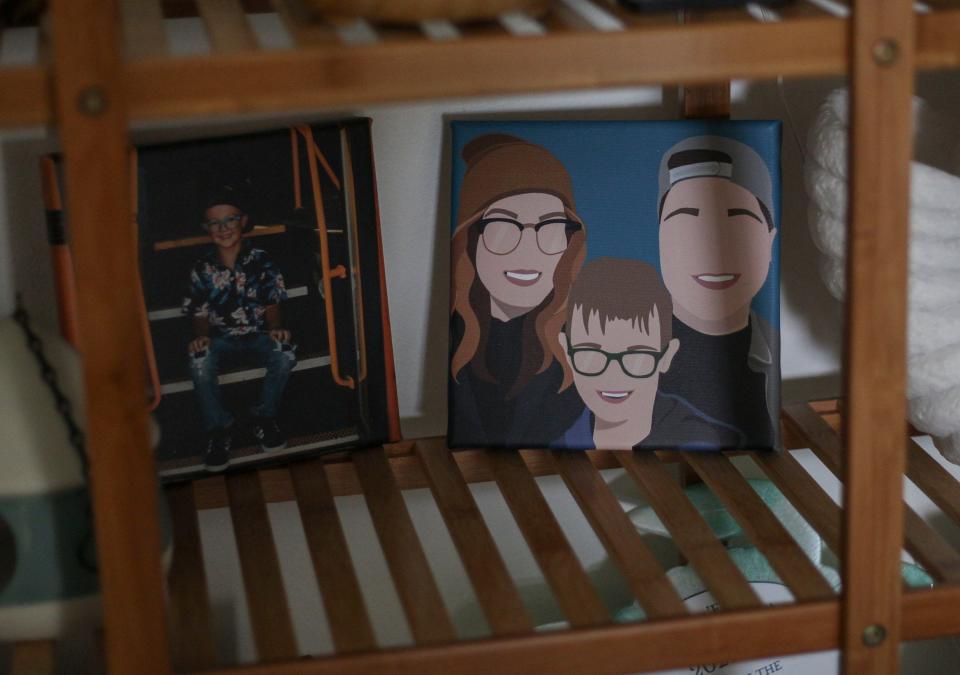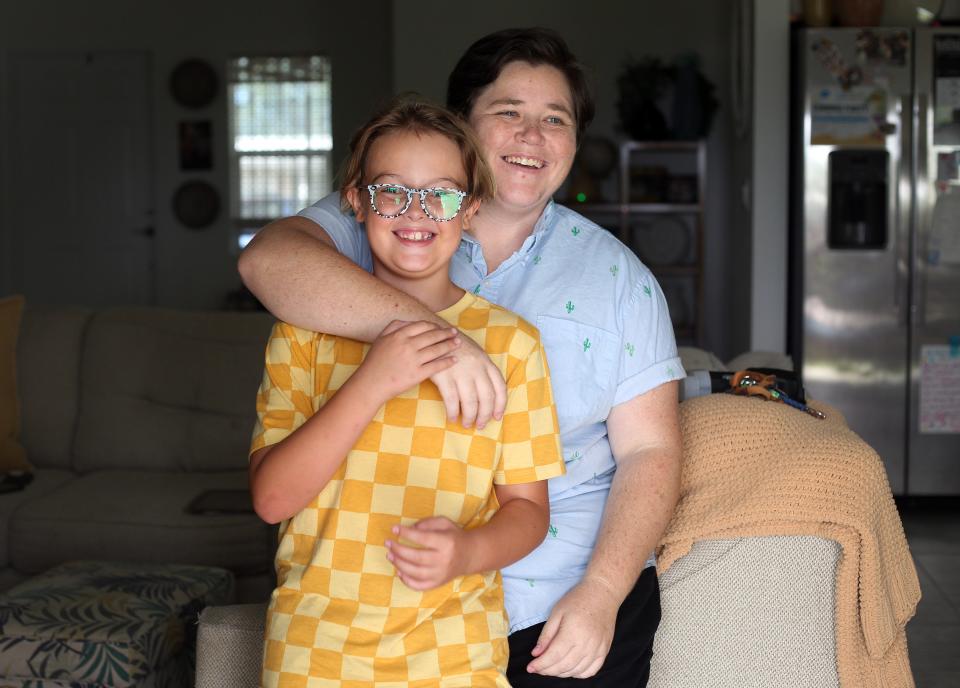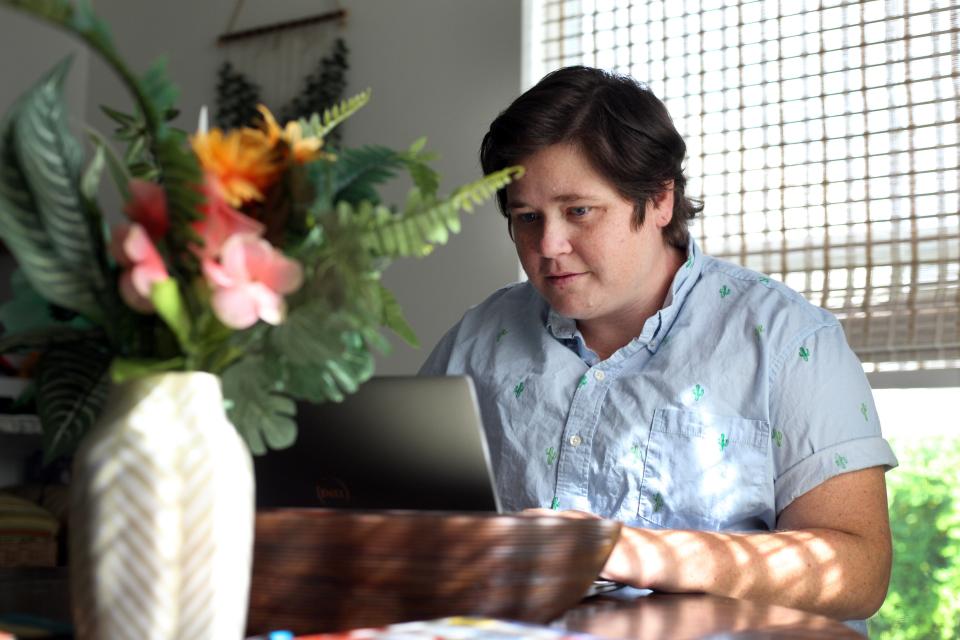Sebastian native becomes the advocate for LGBTQ+ youth mental health care they never had
Logan Lauger loved learning but couldn’t bear to attend classes. As a Sebastian River High School student in the late 2000s, Lauger arrived late or skipped, with the restroom providing regular respite from classmates’ cruelty.
Lauger, whose pronouns are they/them/their, endured bullying so severe it stifled their intellectual curiosity and academic achievement. Not to mention the anxiety and depression that hemorrhaged into other areas of their life.
The city was too conservative for Lauger to feel comfortable in their own skin, plus they were teased about their weight.
“I was afraid that coming out would just put another target on my back,” Lauger said. “I felt pressured to conform to societal norms … it felt really hard for me to be different.”

Lauger’s preference for masculine clothes got the rumor mill grinding. They didn’t come out on their own terms; by senior year, their peers had made an assumption about their gender identity and sexual orientation.
“I didn’t really acknowledge the rumors, even though they were true,” Lauger said. “I just didn’t want to prove that everybody was right, because I figured it would make [the bullying] worse.”
Lauger, now 31, identifies as queer, nonbinary and is dedicating their career to what they navigated adolescence without: mental health care tailored to lesbian, gay, bisexual, transgender and queer and/or questioning youth. Lauger wants to launch a private mental health care practice for LGBTQ+ children and teens in Sebastian.

Mental health care lacking for LGBTQ+ youth
In 2020, less than a third of U.S. youth-serving mental health facilities offered care specific to LGBTQ+ patients, according to a study published this summer in JAMA (Journal of the American Medical Association) Pediatrics. In terms of facilities per 100,000 children, Florida ranked 46th, with 1.92 per capita.
Top-ranked Alaska had 9.79, while bottom-ranked Alabama had 0.83. Florida ranked higher — 21st — in its percentage of youth-serving mental health facilities offering treatment for gender and sexual minorities: 28%.
With fewer than two facilities per capita, access to care in Florida is inequitable, said study coauthor Kristen Choi, a child and adolescent psychiatric nurse and assistant professor at the University of California, Los Angeles School of Nursing.
“This is an emerging (research) area,” Choi said. “We hope that the work can point all of us who work in mental health toward thinking a little bit more carefully about how we can serve this population.”
Nearly 2 million adolescents ages 13-17 identify as LGBTQ+, according to a 2020 population estimate published by the Williams Institute at the UCLA School of Law. About 114,000 live in Florida. Only California and Texas have more.
Despite decreasing stigma surrounding mental illness and increasing social acceptance of LGBTQ+ people, the mental health disparities they weather have received less attention, Choi said.
“I have seen a trend in practice that there’s always a really high share of our patients who are attempting suicide who are on the LGBTQ+ spectrum,” Choi said. “That’s been notable and frustrating to me.”
LGBTQ+ high schoolers disproportionately consider suicide
In 2021, a larger share of LGBTQ+ high school students reported having seriously considered suicide compared to their heterosexual peers, according to a Centers for Disease Control and Prevention survey:
47%: Lesbian, gay or bisexual
40%: Other/questioning
14%: Heterosexual.
Depressive symptoms and disorders were three times more prevalent among sexual minority youth than their heterosexual peers, per a 2017 study in the Australian & New Zealand Journal of Psychiatry. In a 2020 Trevor Project survey, over half the LGBTQ+ individuals ages 13-24 reported wanting mental health care but not receiving it — particularly in the South.
Lauger hopes to mend that fissure after an inspiring three-year AmeriCorps stint in Washington, D.C., working at an elementary school alongside a social worker and a mental health counselor.
“I enjoyed every minute of it,” Lauger said. “It was the coolest experience and it … told me that this is what I’m meant to do.”
Lauger double-majored in psychology and sociology at Florida Atlantic University and is a graduate student at Southern New Hampshire University, working toward a master’s degree in clinical mental health counseling.
SunServe, an LGBTQ+ social service agency with offices in Fort Lauderdale and Wilton Manors, is another inspiration.
“They offer a place for LGBTQ+ youth to go after school. They do all sorts of different things for the community,” Lauger said. “I wanted to do something like that for Indian River County.”
Parent of LGBTQ+ teens: ‘I don’t know how to fix it’
Thirteen years after Lauger graduated high school, Mary Esposito’s children are enduring their teenage years in eerily similar fashion. Esposito’s 14-year-old daughter is bisexual, her 16-year-old son is pansexual and her 18-year-old is nonbinary.
The Vero Beach mother supports them unconditionally, she said.
“It’s the other people that hate my kids for just existing,” Esposito said. “It hurts my heart.”
On top of being teased for being LGBTQ+, her multiracial children have withstood racial slurs. The Indian River Charter High School administration doesn’t tolerate bullying, so it’s been under the radar for her son, she said.
Vero Beach High School, however, was hell for her eldest child. The experience was so traumatic, Esposito pulled them from school and plans to homeschool her youngest, who would’ve been a freshman there this fall.
“They don’t know how to deal with this,” Esposito said of the in-school counseling her eldest received.
Aside from scaling up the country’s mental health workforce and designating more research funding toward the psychiatric treatment of sexual and gender minorities, clinical education must be revamped, Choi said.
A handful of schools and programs “do an excellent job teaching their medical students and nursing students about how to provide compassionate care,” Choi said. “But the problem is that it’s just not consistent.”
Florida’s political climate has worsened matters with such controversial legislation as the so-called “Don’t Say Gay” bill. It was championed as child protection by Republican Gov. Ron DeSantis and the conservative Legislature, and condemned as anti-LGBTQ+ by Democrats and civil rights groups.
Finding LGBTQ+ support in Florida
Esposito and her children have found solace at the Mental Health Association in Indian River County. Things are back on track for her eldest, who earned an accounting degree from Indian River State College and will start on a bachelor’s this fall.
Still, Esposito wonders if her children will ever enjoy a hate-free life.
“I want what the Statue of Liberty says. I want unity. I want everybody to get along,” Esposito said. “I don’t know how to fix it.”
Lauger is set to graduate next spring, then get a state license. A private practice remains on the horizon.
“People think I’m crazy when I say that I want to start off opening my own practice,” Lauger said. “I want to go right out of school and start from the ground up.”
Until then, Lauger’s advice to LGBTQ+ youth is to find a support system of family, friends or a peer who identifies the same way. But connecting with anyone who can lend an ear helps make life more bearable, Lauger said.
“If I were to go back and tell my younger self something, it would probably be, ‘Trust yourself, be who you are and be proud of it.’ ”
Lindsey Leake is TCPalm’s projects reporter. She has an M.A. in Science Writing from Johns Hopkins University, an M.A. in Journalism and Digital Storytelling from American University and a B.A. from Princeton University. Follow her on Twitter @NewsyLindsey, Facebook @LindseyMLeake and Instagram @newsylindsey. Call her at 772-529-5378 or email her at lindsey.leake@tcpalm.com.
Read more of Lindsey’s stories and support her work with a TCPalm subscription.

This article originally appeared on Treasure Coast Newspapers: LGBTQ+ children, teens in Florida face mental health care inequities
